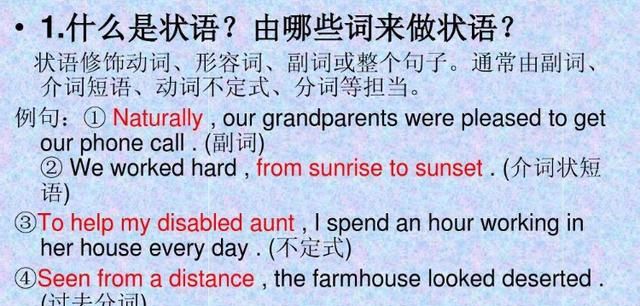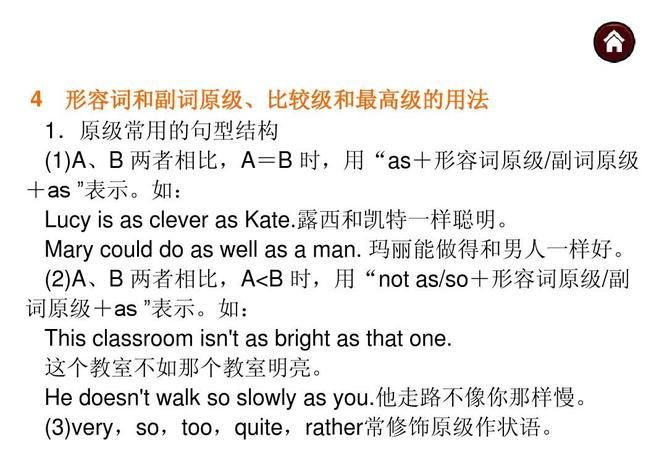本文目录
形容词可以作状语么
句中的 upset 是状语吗?如果是的话,? 【问题分析】 形容词在句子中的主要作用是用作表语、定语、宾语补足语等,但有时它也可用作状语。一般说来,形容词用作状语主要表示以下用法: (1) 表示伴随(即用作伴随状语)。如: Your friend comes to school very upset. 你的朋友来到学校心情很不好。 They waited, breathless, for the result. 他们屏住呼吸等待结果。 The manager approached us full of apologies. 经理满怀歉意向我们走来。 The boy nodded, pale and scared. 男孩点点头,脸色苍白十分惊恐。 (2) 表示原因(即用作原因状语)。如: Overjoyed, she dashed out of the house. 她非常高兴,急步跑出屋去。 Curious, we looked around for other guests. 由于好奇,我们向四面看看有什么别的客人。 Greatly disappointed, he decided to leave the place. 他大为失望,决定离开这个地方。 Unable to afford bus fares, she walked to interviews. 由于没有钱坐公共汽车,她走路去参加面试。 (3) 表示结果(即用作结果状语)。如: He emerged from the accident unharmed. 他在车祸中没有受伤。 The children came home, tired and hungry. 孩子们回到家里,又累又饿。 (4) 表示让步(即用作让步状语)。如: Right or wrong, he always comes off worst in an argument because of his inability to speak coherently. 由于讲话语无伦次,所以不论有理没理,他在辩论中的表现总是非常糟糕。 Wet or fine, he got up at six and took a walk in the park. 不管是晴天还是下雨天,他总是六点钟起床,并到公园里散散步。 (5) 表示说话人的态度(即用作语法上的评注性状语,也有的语法书称之为独立成分)。如: Strange to say, he is still ignorant of it. 说也奇怪,他还不知道这件事。 More important, he’s got a steady job. 更重要的是他得到了一个稳定的工作。 And most important of all, she had faith in him. 况且最重要的是,她对他有信心。 (5) 表示时间或条件(即用作时间状语或条件状语,具体需视语境而定)。如: Ripe, these apples are sweet. (=When / If these apples are ripe, they are sweet.) 这些苹果熟了,味道很甜。本栏目更多同类内容

形容词可以作状语么
在现代汉语语法中,形容词常作状语,修饰或限制后面的中心语。如我们要认真学习语文。他积极参加活动。认真,积极是形容词作状语,说明态度。形容词还可作定语,如高大的建筑聂立在前面。也可以作补语,我看清楚了。形容词用途广泛,可作多种成分。

形容词作状语英语例句
你好!形容词除了可以作定语、表语或补语外,还可以在句中作状语,具有副词的功能。形容词作状语用时,一般用逗号将其与句子的其余部分隔开。这种状语可位于句首、句末或句中。它在意义上相当于一个状语从句,具有以下语义和特征。 一、形容词或形容词短语可以作状语,表示行为方式或伴随状况。有时,它会像非限制性定语从句一样,表示意义上的增补,其逻辑主语是句子的主语。例如: 1. Crusoe stared at the footprint, full of fear. (=Curose, who was full of fear, stared at the footprint. )克鲁索两眼死盯着脚印看,内心里充满着恐惧。 2. He approached us, full of apologies. (=He, who was full of apologies, approached us. )他连声道歉地朝我们走过来。二、形容词或形容词短语可以作状语,表示原因。这种状语一般位于句首,有时也可位于句中。例如: 1. Angry at the girl oversleeping, Mr Green went down to wake her up. (=Mr Green went down to wake up the girl because he was angry with her for oversleeping. )格林先生下去叫醒她,是因为她睡过了头惹恼了他。 2. Lin Tao, glad to accept the suggestion, nodded his agreement. (=Because he was glad to accept the suggestion, Lin Tao nodded his agreement. ) 因为林涛很乐意接受这个建议,所以他就点头同意了。三、形容词或形容词短语可以作状语,表示时间或条件。这种状语通常位于句首,也可位于句末。例如: 1. Ripe, these apples are sweet. (=When / If these apples are ripe, they are sweet. )这些苹果熟了,味道很甜。 2. Enthusiastic, they are quite cooperative. (=When / If they are enthusiastic, they are cooperative. ) 他们热心时是很愿意合作的。四、形容词或形容词短语可以作让步状语。这种状语常由连词or连接的两个或两个以上的并列形容词构成,一般位于句首,有时也可位于句中。例如: 1. Right or wrong, he always comes off worst in an argument because of his inability to speak coherently. (=Whether he is right or wrong, he always comes off worst because of his inability to speak coherently. ) 由于讲话语无伦次,所以不论有理没理,他在辩论中的表现总是非常糟糕。 2. Wet or fine, he got up at six and took a walk in the park. (= Whether it was wet or fine, he got up at six and took a walk in the park. ) 不管是晴天还是下雨天,他总是六点钟起床,并到公园里散散步。五、形容词或形容词短语可以作状语,表示结果或存在的状态。这种状语在句中的位置比较灵活。例如: 1. For a moment she just stood there, unable to believe what had just happened. 她在那儿呆呆地站了一会儿,不敢相信刚才发生的事情。 2. One woman was lying in bed, awake, listening to the rushing wind. 有一个女人躺在床上,毫无睡意,静听那疾驰而过的大风。六、形容词或形容词短语可以在句首作状语,表示说话人的态度。例如: 1. Strange, he should have done such a thing. 奇怪,他做了这样一件事。 2. Worse still, the lion could even carry off the baby it its mouth. 更糟糕的是,狮子甚至能把婴儿叼走 若满意,请采纳!有疑问,欢迎追问!谢谢!

形容词可以做状语吗英语
一、英语:形容词做状语.
1、形容词能做伴随状语:
Tired,the students went to the top of Mount Tai.
形容词能做原因状语:
2、Tired and short of food,the students didn't want to go ahead.
(例子取自于百度知道网友)
二、汉语:形容词做状语.
1、快跑.2、慢走.

以上就是关于形容词可不可以作状语 ,形容词可以作状语么的全部内容,以及形容词可不可以作状语 的相关内容,希望能够帮到您。

